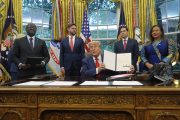
In a move that Politico claims is somehow connected to making lives better for workers in a crushing economy, Michigan’s Democrat governor Gretchen Whitmer has struck down her state’s Right to Work Act.
That bill protected employees in Michigan from being compelled to fund a union against their will. Thanks to Whitmer’s repeal, it is unions — not working Americans and their families — that will enjoy government protections.
Now, unions can force membership on workers and make them pay dues as a condition of hire or continued employment. The National Law Review expects the change “to be effective in July, 90 days after the close of the state’s legislative session.” Whitmer signed the repeal bill last Friday.
Michigan is the first state in 58 years to repeal a right-to-work act. That is thanks to the fact that for the first time in 40 years, Democrats control Michigan’s state government.
According to Bloomberg Law, the last right-to-work repeal took place in Indiana in 1965. Michigan’s latest move decreases the number of right-to-work states to 26.
Besides taking away workers’ rights and making the state less attractive to businesses, Whitmer’s repeal of Right-To-Work will ensure unions have more money to donate to Democrats.
Limits to Law
There are limits to what employees can be forced to pay, however. The National Right to Work Legal Foundation (NRTW) explains that “workers still have rights under federal law to opt out of formal union membership and to refuse to pay for union political or ideological expenditures.”
The “political or ideological expenditures” aside, “in a workplace under union control, the most that union bosses can force nonmember workers to pay is only a portion of ‘what the union can prove is its costs of collective bargaining, contract administration, and grievance adjustment with their employer,’ an amount that does not include ideological expenses.” This is according to the U.S. Supreme Court’s decision in Pattern Makers v. NLRB [the National Labor Relations Board].
The latter was set up by the National Labor Relations Act, which also protects workers from having union fees directly deducted from their paychecks.
However, NRTW points out that unions “often fail to meet their legal obligation to inform workers of their right not to be a union member and to object to paying full union dues.” It is common practice, says NRTW, for unions to “mislead workers to believe that they must join the union to keep their jobs.”
Defending Workers
Meanwhile, Republican U.S. Senator Rand Paul of Kentucky has introduced a National Right to Work bill, S. 532. The legislation has 22 cosponsors. Here is Paul’s description:
South Carolina Republican Congressman Joe Wilson also introduced a companion bill in the U.S. House, H.R. 1200. Forty-eight of his colleagues have cosponsored that legislation.
Both House and Senate versions would end labor unions’ authorized power to force workers to pay union dues as a condition of employment. Mark Mix, NRTW president, said, “In an age of legislative overreach, this is one of the shortest bills ever introduced. The National Right to Work Act does not add a single word to federal law. It simply removes language in depression-era law that gives union officials the power to extract dues from non-union workers as a condition of employment.”
There are also bills at the Federal level to override state right-to-work laws and give unions the power of coercion over workers. Bernie Sanders introduced the Richard L. Trumka Protecting the Right to Organize Act of 2023 (S. 567) in the Senate. It has 47 cosponsors. Its companion bill in the House, H.R. 20, introduced by Virginia Democrat Bobby Scott, boasts 208 cosponsors.




